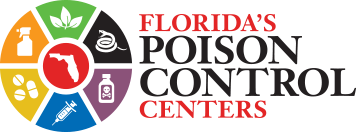Plants
Poisonous and irritant plants can be a problem for small children who are curious and take a nibble. Some cats, puppies or other pets may also eat random plants and be at risk for a serious poisoning. Many plants are poisonous to both humans and animals. We recommend knowing the names of the plants in your house and yard and removing the most toxic species from play areas (see the chart below for information about many Florida plants). Callers to poison centers may attempt to send pictures of a plant after a suspected poisoning. The poison center staff may be able to identify the more common varieties. In most cases, absolute identification by having prior knowledge of the plant name or having a professional identify the plant (nursery) is preferred. This can help make a rapid identification and help poison center staff assess the situation. Most plant poisonings do not require hospitalization, and callers receive all the help they need over the phone. Some of the more dangerous plants common in Florida are described below.
For more information about the poisonous and irritant plants of Florida, see our flyer or visit The University of Florida IFAS Extension Program.
Prevention
Find out the names of your house and yard plants. Call the Poison Center toll-free at 1-800-222-1222 to see if your plants are toxic. Below is a partial list of common poisonous plants.
First Aid
If the plant is ingested, remove all plant pieces from mouth. Rinse mouth and lips with cool water. Offer sips of cool water to drink. If your skin comes in contact with these plants, wash your hands with soap and water. Call the Poison Center immediately.
Plant Names and Medical Problems
| Arrowhead, Dieffenbachia, Caladium, Philodendron, Peace Lily Pothos |
The leaves and stems contain oxalate crystals that cause immediate pain when chewed. Burning and irritation in the lips, mouth and throat can occur. If plant parts are swallowed, vomiting can occur. |
| Oleander, Lily of the Valley, Foxglove |
All parts of the plants are poisonous if swallowed or if smoke from a burning plant is inhaled. Symptoms include nausea, vomiting, stomach cramps, dizziness, low blood pressure, slow pulse and seizures. |
| Castor Bean, Rosary Pea, Rosary Bean |
Swallowing a chewed or split bean can cause bloody vomiting, diarrhea, abdominal pain, drowsiness and death from liver or kidney damage. |
| Glory Lily, Gloriosa Lily, Autumn Crocus | Eating any part of the flower or bulb can cause vomiting, diarrhea, abdominal pain and chest pain. Deaths result from damage to heart, kidneys, liver and lungs. |
| Common Lantana | Eating unripe berries can cause enlarged pupils, blurry vision, vomiting, weakness, dizziness, flushed skin and shallow breathing. |
| Chinaberry | Eating the bark or ripe berries can cause diarrhea, vomiting, seizures, clammy skin, weakness and difficulty breathing. |
| Common Crotons | Milky sap can cause skin irritation. Nausea, vomiting or diarrhea may occur if plant is eaten. |
| American Holly | Eating leaves and berries can cause drowsiness, vomiting and dehydration. |
| Poinsettia | This plant is only mildly toxic. Eating one leaf may cause mild irritation to the mouth. If many leaves are swallowed, vomiting may occur. |
| Angel’s Trumpet, Devil’s Trumpet, Jimson Weed |
When flowers, leaves or seeds are eaten, problems such as dry mouth, muscle weakness, high blood pressure, fast pulse, difficult urination, confusion, flushed skin, fever, enlarged pupils, blurred vision and constipation can occur. |
| Poison Ivy, Brazilian Pepper |
Touching the leaves or oil from the plant can cause an itchy rash with blisters. Inhaling smoke from burning plants or plants in bloom may cause wheezing or breathing difficulty. |
| Wild Mushrooms | The type of illness varies depending on which type of mushroom was eaten. Problems may include vomiting, diarrhea, abdominal pain, hallucinations, kidney failure, liver failure, allergic reaction, burning thirst, headache, sweating, lung congestion, seizures and death. If any person or pet eats part of an unidentified wild mushroom call the poison specialists at 1-800-222-1222. |

